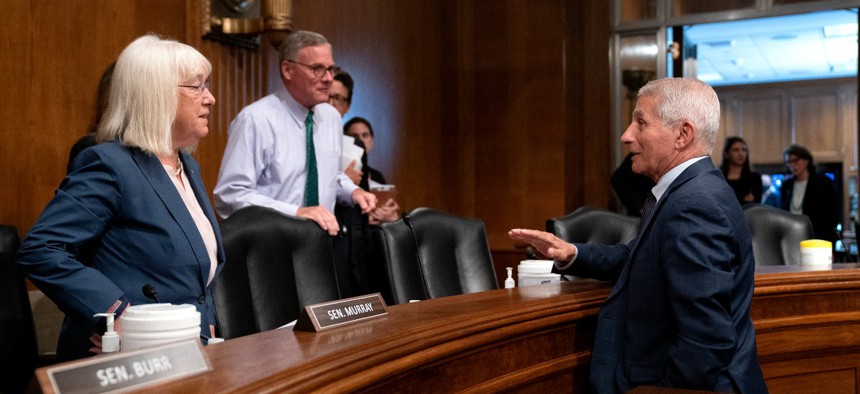A bipartisan bill would make it easier to hire feds during public health emergencies

Bill sponsors Sens. Patty Murray, D-Wash., and Richard Burr, R-N.C. (center) speak to Dr. Anthony Fauci, director of the National Institute of Allergy and Infectious Diseases, after a hearing in July 2021. Stefani Reynolds-Pool/Getty Images
The measure would also seek to improve interagency collaboration.
A bipartisan bill to better prepare the United States for future pandemics that is gaining momentum in Congress would reform certain federal hiring practices and boost interagency collaboration in an effort to reduce the mistakes that hobbled the government during the COVID-19 outbreak.
The 2022 Prepare for and Respond to Existing Viruses, Emerging New Threats and Pandemics (PREVENT Pandemics) Act (S. 3799) would allow the Health and Human Services Department to bypass the normal hiring process for any position designated by the secretary during a public health emergency. The exemptions would also apply to any role at the department experiencing severe shortages, though they would be limited to 500 hires per fiscal year. The Senate Health, Education and Labor Committee approved the bill this week after it was introduced by the panel's chair and ranking member, Sens. Patty Murray (D-Wash.) and Richard Burr (R-N.C.).
The measure would also require the Government Accountability Office to report on hiring challenges at the Food and Drug Administration. The auditors would examine recruiting and retention programs FDA uses and how high vacancy rates have impacted its COVID-19 response. GAO would identify the root causes of the hiring challenges and what plans FDA has to fix them.
“After all our families have been through, we owe it to everyone who has worked so hard to get us through this pandemic to take action so we are never in this situation again,” Murray said. “I’m glad we are coming together and showing Americans there is bipartisan agreement.”
The bill would create an independent task force to launch a comprehensive review of the government’s response to the pandemic. Burr said the legislation would both "fill current gaps" and build on successes in the COVID-19 response.
“With this bill, Congress can help ensure America has better tools, better resources, and stronger leadership for the next threat we will inevitably face,” Burr said.
Aiming to fix a chaotic rollout of responsibilities in the first months of the COVID-19 outbreak, the measure would grant the HHS secretary new authority to coordinate with other agencies and request their support. The government would engage in pandemic response exercises every five years. The bill would improve interagency research coordination during public health emergencies, led by the National Institutes of Health.
It would also formally authorize the Advanced Research Projects Agency for Health, or ARPA-H. The recent fiscal 2022 omnibus funding bill allocated $1 billion to stand up the disease research agency, which President Biden first proposed as part of his initial budget request.
The White House is still seeking $22.5 billion in emergency funding to fight COVID-19 after Congress punted any such spending from the omnibus package last week. The Biden administration said it needs the money to purchase additional treatments and tests, procure more vaccine doses, continue research and conduct surveillance of potential new strains.



